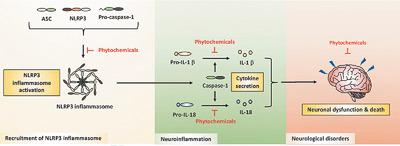当前位置:
X-MOL 学术
›
Mol. Nutr. Food Res.
›
论文详情
Our official English website, www.x-mol.net, welcomes your feedback! (Note: you will need to create a separate account there.)
Targeting the NLRP3 Inflammasome in Neuroinflammation: Health Promoting Effects of Dietary Phytochemicals in Neurological Disorders.
Molecular Nutrition & Food Research ( IF 5.2 ) Pub Date : 2019-11-18 , DOI: 10.1002/mnfr.201900550 Wei-Lun Hung,Chi-Tang Ho,Min-Hsiung Pan
Molecular Nutrition & Food Research ( IF 5.2 ) Pub Date : 2019-11-18 , DOI: 10.1002/mnfr.201900550 Wei-Lun Hung,Chi-Tang Ho,Min-Hsiung Pan

|
Neurological disorders occur in the central and peripheral nervous system and include Alzheimer's disease, stroke, and spinal cord injury. Activation of the innate immune system inevitably occurs in all forms of neurological disorders. The NOD‐, LRR‐ and pyrin domain‐containing 3 (NLRP3) inflammasome is a multimolecular complex that can sense danger signals associated with neurological disorders. Assembly of the NLRP3 inflammasome promotes caspase‐1‐mediated interleukin‐1β and interleukin‐18 maturation in microglia, where neuroinflammation contributes to neurological disease development and progression. Thus, this review attempts to elucidate the current knowledge regarding NLRP3 inflammasome activation and its crucial role in the pathogenesis of neurological disorders. Recent scientific findings with respect to neuroprotective effects of dietary phytochemicals against NLRP3 inflammasome‐mediated neurological disorders summarized in this review suggest that modulation of the NLRP3 inflammasome assembly by plant‐derived phytochemicals could be a potential strategy for prevention or treatment of neurological disorders.
中文翻译:

在神经炎症中靶向NLRP3炎性体:在神经系统疾病中饮食植物化学物质的健康促进作用。
神经系统疾病发生在中枢神经系统和周围神经系统,包括阿尔茨海默氏病,中风和脊髓损伤。先天免疫系统的激活不可避免地发生在所有形式的神经系统疾病中。含有NOD,LRR和吡啶结构域3(NLRP3)的炎性小体是一种多分子复合物,可以感知与神经系统疾病相关的危险信号。NLRP3炎性小体的组装可促进小胶质细胞中caspase-1介导的白介素1β和白介素18的成熟,其中神经炎症会促进神经系统疾病的发生和发展。因此,本综述试图阐明有关NLRP3炎性小体激活及其在神经系统疾病发病机理中的关键作用的当前知识。
更新日期:2019-11-18
中文翻译:

在神经炎症中靶向NLRP3炎性体:在神经系统疾病中饮食植物化学物质的健康促进作用。
神经系统疾病发生在中枢神经系统和周围神经系统,包括阿尔茨海默氏病,中风和脊髓损伤。先天免疫系统的激活不可避免地发生在所有形式的神经系统疾病中。含有NOD,LRR和吡啶结构域3(NLRP3)的炎性小体是一种多分子复合物,可以感知与神经系统疾病相关的危险信号。NLRP3炎性小体的组装可促进小胶质细胞中caspase-1介导的白介素1β和白介素18的成熟,其中神经炎症会促进神经系统疾病的发生和发展。因此,本综述试图阐明有关NLRP3炎性小体激活及其在神经系统疾病发病机理中的关键作用的当前知识。



























 京公网安备 11010802027423号
京公网安备 11010802027423号